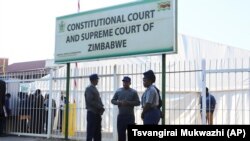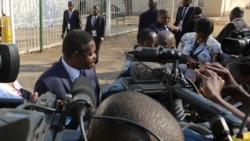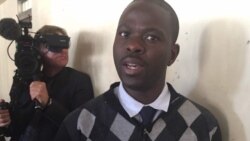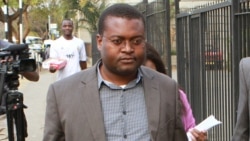With the Constitutional Court hearing now out of the way, and Zimbabwe’s incumbent President Emmerson Mnangagwa declared the duly-elected president, plans for his inauguration are now underway, as stipulated by the country’s constitution.
“Inauguration has to be held within 48-hours of the announcement of the decision,” said Zanu-PF Secretary for Legal Affairs, Paul Mangwana. “Which means that the inauguration has to be held at least by Sunday,” noted Mangwana, who was also a member of Mnangagwa’s legal team.
Echoing a tweet from Mnangagwa applauding the nine-member legal team for the unanimous ruling, Mangwana said his party felt vindicated by the judicial process, which was aired live by the state broadcaster, ZBC.
“We have seen our new Constitution at work, we have seen the Constitutional Court reviewing and endorsing the election of President Mnangagwa, we are very happy about that as Zanu-PF,” said Mangwana.
While the ruling Zanu-PF party celebrated its court victory, the opposition Movement for Democratic Change (MDC) Alliance which lodged the formal challenge to President Mnangagwa’s July 30th election victory, alleging that the election was rigged, was not.
“The party rejects the results very clearly,” said Nkululeko Sibanda, spokesperson for the 40-year-old Nelson Chamisa, who gave Mnangagwa the stiffest competition of all the 23 presidential candidates.
“The party knows very well that (MDC-T) president Nelson Chamisa won this election by 2.6-million votes, and that Mnangagwa lost it with two million votes,” said Sibanda.
With no legal recourse left however, given that the Constitutional Court ruling is final, analysts say Mnangagwa’s victory is yet to pass the legitimacy test of the country’s citizens, many of whom believe his victory was facilitated by the Zimbabwe Election Commission (ZEC), which adjusted the election results three time, before the final ruling.
Zimbabwean constitutional lawyer and lecturer at Kent University in the UK, Alex Magaisa, said the changing of results has tainted the electoral body and by extension, Mnangagwa’s victory. Magaisa said the Constitutional Court’s failure to press ZEC on these changes, further compromised its ruling.
“If an electoral authority is going to change electoral results three times after it has made a declaration … which is illegal, you expect the court to raise issues and to interrogate the Zimbabwe Electoral Commission on the manner in which it conducted the election,” said Magaisa.
Despite losing the court challenge, Magaisa, who served as the advisor to the late MDC leader Morgan Tsvangirai, during his five-year tenure as prime minister in the Government of National Unity, said the MDC Alliance put up a “stately, courageous and valiant performance,” that exposed the weaknesses of the process.
Magaisa said an objective court would have considered their evidence.
“I believe that sufficient information and evidence was placed before the court in order to come to that conclusion, but of course the MDC (Alliance) is complaining that this was a pre-determined decision,” said Magaisa.
Lead advocate for the MDC Alliance, Thabani Mpofu, who spoke to the media after the ruling, too alluded to the Court’s lack of objectivity, saying the process had “serious legitimacy issue,” and left it to the court of public opinion.
“The good thing is that the people followed through the proceedings, and they are entitled by law to come up with their own conclusion.”
Meantime, Magaisa said more than just appeasing the Zimbabwean citizens, Mnangagwa and his government now have to earn the respect and trust of the international community, particularly countries like the United States and the United Kingdom, which are critical to Zimbabwe’s economic revival.
“You must remember that Mr. Mnangagwa has won this election according to the court, by a very slender majority, which means that half the country is ostracized. The challenge for them is how do they see the bigger picture, how do they get everybody working together in order to achieve the bigger process,” said Magaisa, adding, “I think it is important for Mr. Mnangagwa, Mr. Chamisa and other people who are concerned with the welfare of Zimbabwe and Zimbabweans to find a way out of this lockjam that we are facing.”
In one of the several tweets that he sent out after the ruling, President-elect Mnangagwa appealed for peace and invited Chamisa to join him in moving the country forward.
“I once again reiterate my call for peace and unity above all. Nelson Chamisa, my door is open and my arms are outstretched, we are one nation, and we must put our nation first. Let us all now put our differences behind us. It is time to move forward together,” tweeted Mnangagwa.
However, not all of Zanu-PF members are in tune with this message. Speaking on VOA Studio 7’s Livetalk show, one of the members of Mnangagwa’s legal team, Tinomudaishe Chinyoka, dismissed the need to appease the international community or the opposition, saying the Constitutional Court outcome was transparent enough.
“We don’t run our country based on who likes us,” said Chinyoka, insisting that the world should now meet Zimbabwe on its own terms, since it has fulfilled its commitment to a democratic process.








